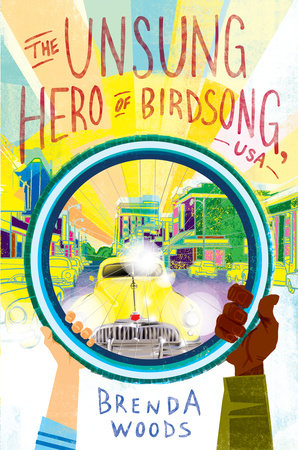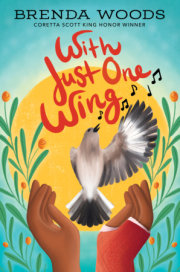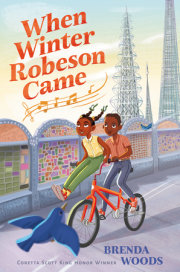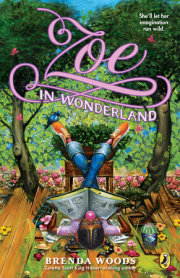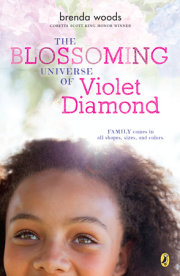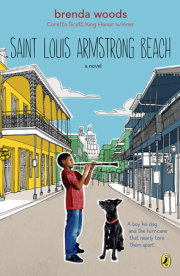CHAPTER 1 One funny thing about life and all the stuff that happens while you’re living it is that mostly you only see it through your own eyes, that is, unless you decide to try to see things through the eyes of someone else. Then, you have four eyes, and looking at things with more eyes than just your own lets you see things more clearly—maybe even see things the way they really are, not just the way you want them to be.
That’s what Meriwether claimed, and now I know he sure was right. But then again, seems like Meriwether was right about a whole mess of stuff.
My name is Gabriel, like the angel, but I’m sure not
ready for heaven. I don’t have any brothers or sisters, and at times I wish I did. And we aren’t rich, but we’re a ways from being poor, and being a ways from being poor is how I got the bicycle, and having the bicycle is how I met Meriwether, and meeting Meriwether is how I learned that seeing life through more eyes than just the two on my face can make some things a lot easier to understand.
It was 1946, just another quiet Sunday in summertime, when I met him in a town not too far off from Charleston, South Carolina—a town named Birdsong. I’d just turned twelve.
CHAPTER 2 “Hot diggity dog!”
It was a brand-spanking-new Schwinn Autocycle Deluxe with a built-in electric light—a present for my birthday. I couldn’t stop grinning. I tested the brakes, traced the handlebars and frame with my fingers, and ran my hand across the seat.
“Gabriel Haberlin, stop pettin’ that bicycle like it’s a puppy dog,” Mama said with a smile. In one hand, she held the dirt-stained gardening gloves she wore when she tended the vegetables in what, even though World War II had been over for nearly a year, she still called her victory garden. The other hand reached up, brushed her long blond hair out of her face, and tucked it behind her ears. Daddy curled his tanned, freckled arm around her shoulder. They were like a real pretty photograph right then, my mama, Agatha, and my daddy, Jake, and I wished we had a roll of film for our camera so I could take a picture of them and some of my new bicycle, but we didn’t. Mama tended to be forgetful about things like that.
“Go on and take it for a ride, Gabriel,” Daddy encouraged me.
So I popped up the kickstand and climbed on—all the while admiring the bright blue and white color and the perfect chrome gleaming in the sun. “Can I go show Patrick? He won’t believe it ’less he sees it.” Patrick’s my best friend and lives across town.
“Sure, but you be careful, now,” Daddy warned as he gave the back of the bike a gentle push. Sunday was his only day off, and the newspaper, which I knew he couldn’t wait to get back to reading, was tucked under his arm.
“I will,” I promised, and off I pedaled, glancing back once at my parents’ happy faces.
“You be sure and be home way b’fore supper!” Mama hollered. “Pineapple upside-down cake you asked for is in the oven! And Cousin Polly and Them are comin’ from Charleston!”
Cousin Polly is Daddy’s first cousin, which I’ve been told makes her my first cousin once removed, and Them includes her husband, Teddy Waldrop, and their sixteen-year-old daughter, Tink, whose real name is Theodora but most people never call her that because if they do, Tink can be counted on to blow at least one fuse, sometimes more. Them also includes Teddy’s mama, Auntie Rita, who claims to possess heavenly insight, meaning she has a deep understanding of spiritual things, but Mama and especially Cousin Polly don’t always seem to believe her.
The fact that they were visiting today had me feeling extremely happy, because whenever Cousin Polly and Them barrel through our front door, the usually quiet house comes alive with joking and laughing, and Cousin Polly always turns the music up loud. And now I was doubly happy my cousin Tink was coming, because Tink and her two-toned green Kodak camera are like macaroni and cheese—almost always together. That she’d take more than a few pictures of me posed and smiling with my new bicycle was a sure thing, and that would make it a cinch for me to remember this day for the rest of my life.
“And tell Patrick he’s welcome for cake and ice cream!” Mama added.
“Yes ma’am, I will!” I shouted.
It was so hot, it almost felt like the sun was sitting right on top of me, but as I raced, the air cooled me off. Soon, I was flying downhill, soaring like a swallow-tailed kite bird, speeding so fast I didn’t even have to pedal. I glanced up, wondering if this was anything close to what my uncle Earl felt like when he was in his P-51 Mustang way up there in the sky. Now and then, I pictured myself becoming a pilot just like him.
Twelve is still kind of a baby age, I caught myself thinking as I rode along. Thirteen sure sounds two tons better. And then I almost laughed. Here I was just turning twelve and already wishing I’d crossed the finish line so I could start thirteen.
Auntie Rita has told everyone over and over since I was a little boy, “Gabriel’s got the eyes of an old soul.” And just that morning I’d studied my face in the mirror, searching for whatever it is Auntie Rita sees when she stares into my eyes. The way she says it, in that whispery voice of hers, makes it sound like being an old soul is a good thing. Right then, I wondered, If I am one, how exactly did that come to be, an old soul in a young body? But when the spooky Spanish moss that sways from the branches of the old oak trees that line some of Birdsong’s streets tickled my face, I laughed out loud and stopped thinking about all that.
Birdsong, South Carolina, is a mostly ordinary place. The closest real city is Charleston, and one trip there is all it takes to make you understand the difference between a real city and our town. Even so, we don’t drive the seventy-five miles to Charleston very often, because Birdsong, USA, has pretty much everything we need.
Main Street has a market, a post office, and a string of shops, including a five-and-dime. Plus, there’s Mr. Summerlin’s drugstore, which also has a soda fountain, and we even have a movie theater. Each end of town has a gas station—including one that has a garage for repairing automobiles plus a lot for selling cars that is owned and operated by my daddy, Jake Haberlin.
Mama called Birdsong a peaceful, pretty place, and most folks, including me, agreed with her.
But some things in the town of Birdsong, USA, were about to change.
CHAPTER 3
Certain things should never ever happen, especially on your birthday when you’re riding your new bicycle for the first time down Main Street. And you’re so busy showing off and watching people turn their heads to take notice of you that you’re not paying attention to the stoplight ahead that has just turned red.
Then suddenly, from the corner of your eye, you catch a glimpse of a car in the intersection heading straight at you—the yellow Buick Roadmaster Mr. Babcock bought from Daddy for his wife, Betty, just the other day. And suddenly you realize you don’t have time to swerve out of its way—so for an instant you figure you’re definitely about to enter the pearly gates of heaven. And the only words that come out of your mouth are “Holy moly!”
Certain things like that should never happen. But they did.
Then, in a flash, you get extremely lucky. Someone pushes you out of the way so that you and the big yellow car don’t collide, but instead you take a very bad dive and wind up crumpled on the street.
The first thing I saw when I opened my eyes was a sign.
Need Work
Honest
Good at fixing things
The next thing I saw was the face of the man who had the sign hanging around his neck. He was colored, and he looked sort of familiar.
“You okay?” he asked.
I sat up and shrugged. “Dunno. Think so.” One of my elbows was skinned and bleeding a little. He reached down to help me up.
“Thank you, mister,” I said, and tried to stand.
“Careful, now . . . Could be something broken,” the man warned.
“You the one who saved me?” I asked.
“I suppose you could say that,” he replied with a slight nod of his head.
“Thank you,” I told him. “Thank you a lot, mister.”
Once I was standing, I could see my prized possession—the car had missed me but not my Schwinn Autocycle Deluxe. The handlebars were twisted, some spokes were bent, and the light was dangling loose.
“Not too bad,” he said, following my eyes. “I can fix it for you if you like. Shouldn’t take but a few minutes. Got my tools right here.”
I read the sign around his neck again. “I don’t have nuthin’ but a dime, mister,” I told him.
He grinned and replied, “Save your money, young man.”
Right then a woman hollering words you usually only hear in church interrupted us. “Oh, my Jesus! Lord have mercy on my soul!”
It was Betty Babcock. She had stumbled out of her car in her high-heeled shoes and was quickly making her way over to me. Other people joined her, and soon, like pigeons pecking at a handful of tossed bread crumbs, they formed a huddle around me.
“I’m fine as could be,” I told them.
The red-faced butcher from DeVear’s grocery store slipped his arms around me and practically carried me over to the curb. The gawking audience trailed us, questions flying from their mouths.
“Are you dizzy?”
I sat down. “No.”
“Can you see?”
“Better than a hawk.”
“Is anything broken?”
I’m not Superman with X-ray vision, I wanted to reply but didn’t. Besides, from what Patrick had told me about how bad it hurt when he fell off his roof and cracked his arm bone in two, I figured nothing was broken. “Don’t think so,” I answered.
Then Mrs. Babcock started yelling again. “My light was green! Tell ’em it was green, Gabriel Haberlin! Tell ’em, please!” Her hair, which Cousin Polly and Auntie Rita claim is not a gift from God but comes instead from her Charleston hairdresser, looked like a bright yellow bird’s nest.
“It’s true,” I told them. “I wasn’t payin’ attention. It’s not her fault . . . not at all. Plus, I’m truly fine as could be.”
That was when Mrs. Betty Babcock got down on her knees in the middle of Main Street, closed her eyes, reached up toward heaven, and shouted three times in a row, “Hallelujah and thank you, Lord!”
It was then I noticed Rosie Riley in the crowd. Rosie is one of the nicest girls at school, and when she laughs, it’s loud and not pretend. She’s a year older than me and is the eldest child of Howard Riley, MD, and claims she is going to be a doctor just like him.
Concern was swimming in her eyes. “Are you all right, Gabriel?” she asked. “Maybe I should go get my daddy.”
Having her attention made me grin. “You kiddin’? It’d take more than this to damage my armor.” I bent my elbow and flexed my muscle, producing a small bulge. “See?”
A smile parted her lips. “Good,” Rosie Riley replied.
Faces that had previously been full of distress now appeared relieved, and I heard a few snickers.
“I’m fine,” I repeated. “Plus, today’s my birthday.”
Birthday wishes spouted quickly from here and there, but only Rosie’s words sounded like a song.
“Happy birthday, Gabriel. I’m glad you weren’t hurt. Woulda been a shame for you to get smashed up bad, especially on your birthday. See ya,” Rosie said, and then she turned and walked away. As usual, my eyes couldn’t help but follow her. She was wearing blue plaid shorts and penny loafers without socks, but I zeroed in on the dance of her straw-colored ponytail as she pranced off.
And knowing that Rosie Riley was glad I hadn’t bitten the dust made me grin some more.
Copyright © 2019 by Brenda Woods. All rights reserved. No part of this excerpt may be reproduced or reprinted without permission in writing from the publisher.

